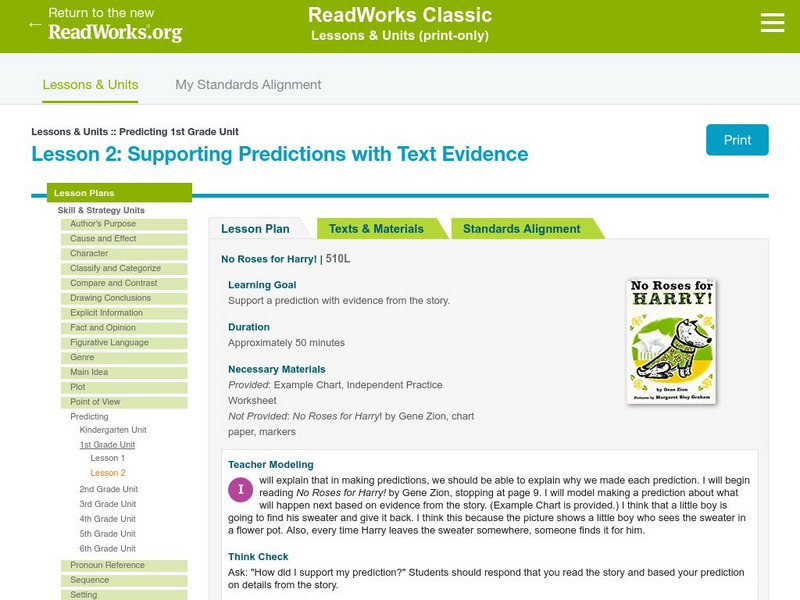Curated OER
Rotation Sensor Challenge
Pupils participate in a challenge to construct a rotation sensor with the highest degree of accuracy and repeatability. They conduct computer analysis of their sensor using repeated trial.
Curated OER
Stratigraphy -- Layers of Time in the Earth
Students are introduced to the process of stratification. Using the internet, they read about the Richard Beene archeological site near San Antonio. Using a map, they color code the different layers present at this site and answer...
Curated OER
Microbial Contaminants in Drinking Water
When presented with three unopened bottles of water, students are asked to tell decide which one is contaminated with a microbe. Students work in small groups and role play being a Microbiologist, a patient, or a recorder. The patient is...
Curated OER
Reservoir Activity
Students research the economic importance of the major reservoirs in Illinois. In groups, they manage a budget for one of the lakes to promote tourism in the area. They also work together to create advertisements.
Curated OER
A Chance of a Life Time
Young scholars view and discuss the painting A Narrow Escape, by Alfred Jacob Miller. They write their own narrative about a time they were either scared or frightened. They make sketches of that time and choose one to paint using...
Curated OER
How Does Water Cause Weathering?
Fourth graders explore the weathering process of water on rocks. They observe how water and friction from other rocks cause them to weather. Students discuss examine and discuss various rocks found on the playground, beach, etc. They...
Curated OER
Predicting the Past
Students study how archaeologists record the past. They discuss archaeology and artifacts. They view a list of artifacts discovered by Marquette at the Illinois Village and answer questions regarding them. They complete a test about...
Curated OER
You Light Up My Life: Developing a Scientific Theory for What Fuels a Candle's Flame!
Students examine how candles work and how scientific theories are developed and tested. Students propose hypotheses about what is burning in a candle then perform tests in order to develop their scientific theory. After a teacher...
Curated OER
Effects of The Great Depression
Seventh graders discuss the unemployment trends of the 1920s-1930's. They look at it faces of the citizens that lived in the time period. Students work with visual clues to investigate about the living conditions during the Great...
Curated OER
Using My Nasa Data To Determine Volcanic Activity
Students use NASA satellite data of optical depth as a tool to determine volcanic activity on Reunion Island during 2000-2001. They access the data and utilize Excel to create a graph that has optical depth as a function of time for the...
Curated OER
Mendellian Genetics
Students describe the inheritance patterns other than simple dominance. They are taught how Mendel's principles apply to all organisms. Students review the use of Punnett Squares. They are taught the principles of probability and...
Curated OER
Air in Soil Administration Procedures
Students study soil and its composition. In this soil composition lesson, students study examples of soil during several days of aeration. Students summarize their data, organize it, and must be able to explain their findings.
Curated OER
Heat Transfer and Pollution
Students perform computer simulations on air dispersion. In this chemistry instructional activity, students calculate energy transfer based on specific heat and temperature change. They explain the causes of smog.
Curated OER
Rock Identification Lab
Eighth graders compare and contrast the three different types of rock. In this earth science lesson, 8th graders classify rock samples according to their correct rock type. They design their own data collection table.
Curated OER
Mineral Lab
Eighth graders examine the physical properties of different minerals. In this earth science lesson, 8th graders explain the uses of minerals in their daily lives. They complete the mineral identification table during the lesson.
Curated OER
Weather Instrument Use and Application
Eighth graders measure temperature, wind speed and pressure using Skymaster SM-28. In this earth science lesson, 8th graders collect data and record observations taken from outdoors. They explain why numerical values are different in...
Curated OER
Weather Elements and Instruments
Eighth graders identify the different weather elements. In this earth science lesson, 8th graders explain the difference between relative humidity and dew point. They discuss the different instruments used to predict weather.
Curated OER
Weather Forecasting Basics
Eighth graders analyze weather diagrams and weather maps. For this earth science lesson, 8th graders explain why it is important to know the weather. They complete a handout at the end of the lesson.
Curated OER
Ecology: Adaptations
Eighth graders identify different types of adaptation in organisms. For this biology lesson, 8th graders explain how adaptation help organisms survive. They complete a worksheet at the end of the lesson.
Curated OER
Wind Turbines
Learners build their own wind turbine. In this physics lesson, students calculate the power output of their wind turbines. They evaluate their design and make the necessary modifications.
Curated OER
Water Cycle
Learners answer short answer questions about the water cycle and other cycles. In this water cycle lesson plan, students explore clouds, rain, evaporation, and more.
Read Works
Read Works: Predicting 1st Grade Unit
[Free Registration/Login Required] A two-lesson unit designed to teach students to make predictions and support them with details from the text. Lessons are based on the books Wemberly Worried by Kevin Henkes and No Roses for Harry! by...
Read Works
Read Works: Drawing Conclusions 3rd Grade Unit
[Free Registration/Login Required] A two-lesson plan unit on drawing conclusions through which students learn how to recognize the difference between implicit information and drawing conclusions. Students also learn to draw conclusions...
Read Works
Read Works: 1st Grade Unit: Supporting Predictions
[Free Registration/Login Required] A lesson utilizing the book No Roses for Harry! by Gene Zionin in which students make a prediction and then support it with details from the text. Ideas for direct teaching, guided practice, and...























